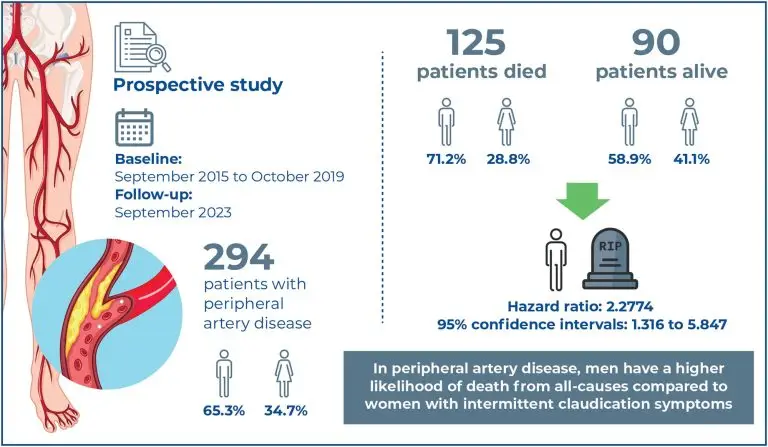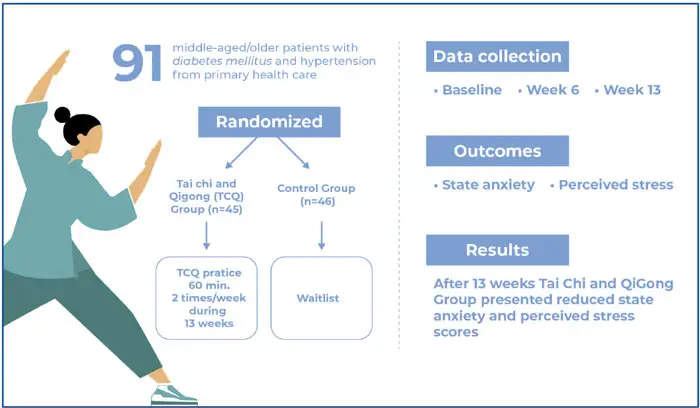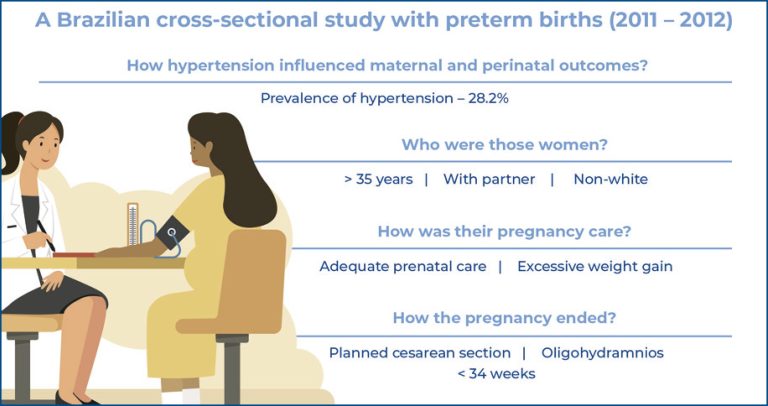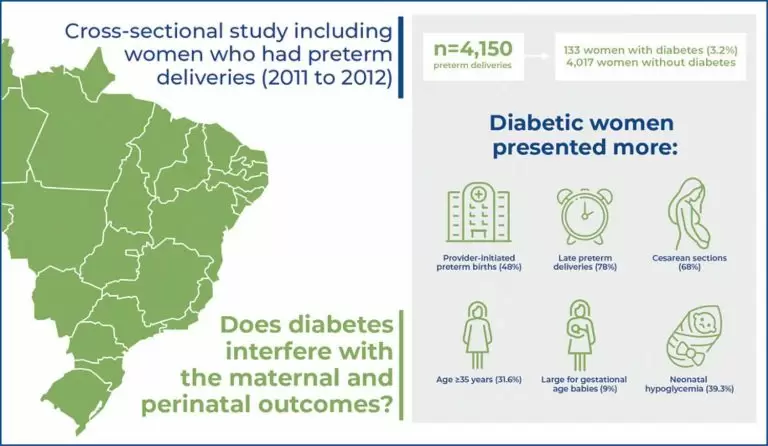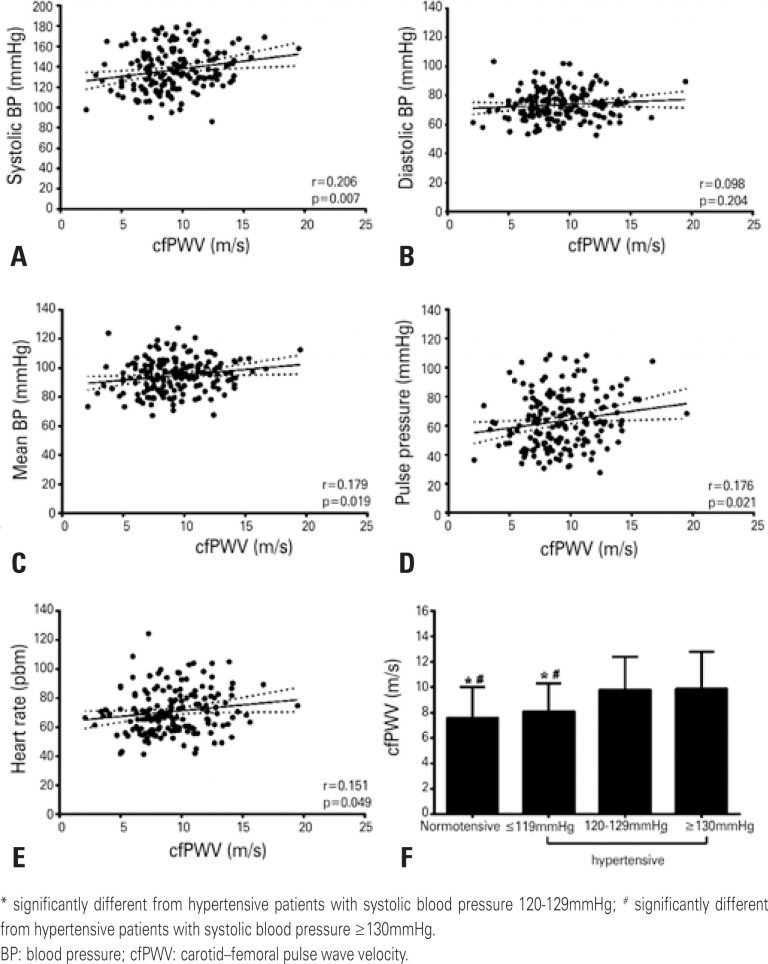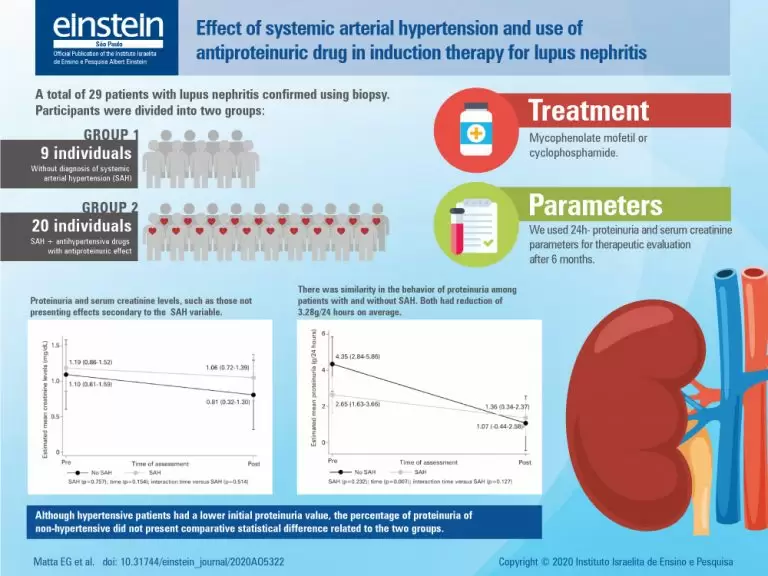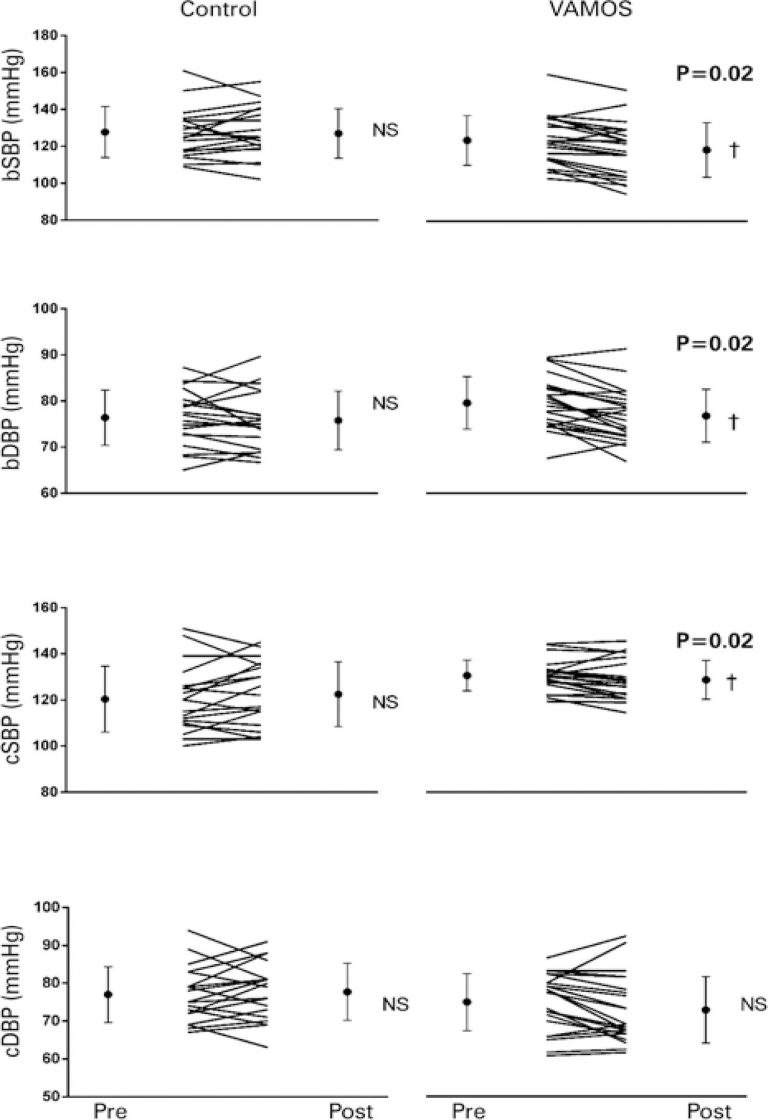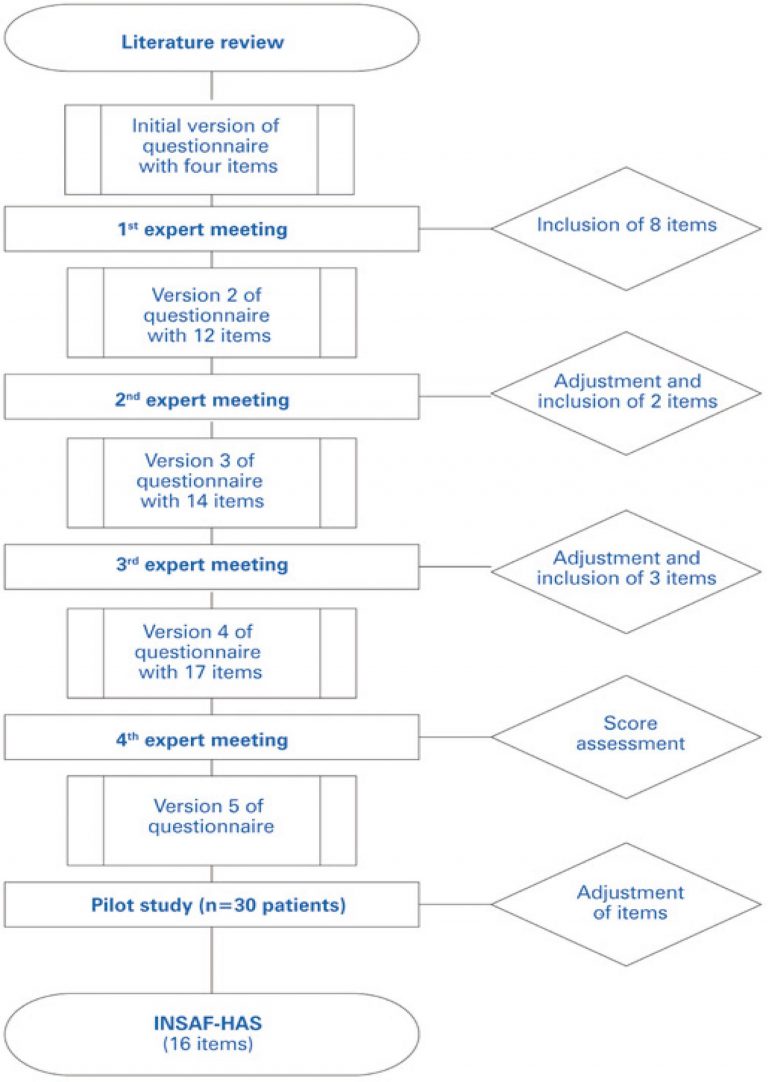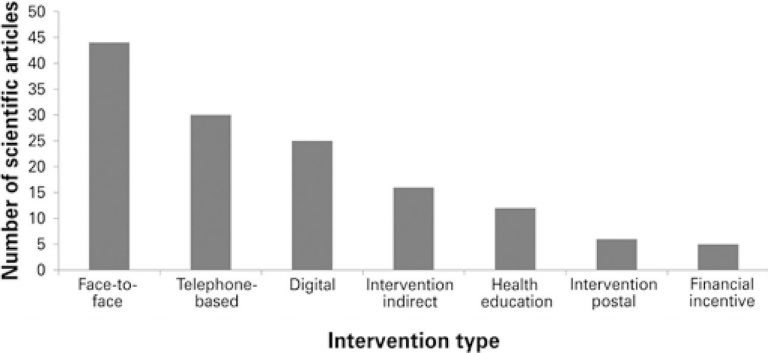11/Sep/2025
Mortality rate in patients with symptomatic peripheral artery disease in Brazil: comparison between sexes
DOI: 10.31744/einstein_journal/2025AO1611
Highlights ■ A total of 58.1% of the patients died during a mean follow-up period of approximately 5.2 years. ■ Cardiovascular diseases are the main cause of death in these patients. ■ Men had a higher likelihood of death from all causes than women. ■ No difference was found between the sexes in relation to the different causes of death. ABSTRACT Objective: To compare mortality rates between sexes in a cohort of patients with intermittent claudication residing in a metropolitan […]
Keywords: Cardiovascular diseases; Hypertension; Intermittent claudication; Mortality; Peripheral artery disease; Respiratory diseases; Sex distribution
17/Mar/2025
Effects of Tai Chi and Qigong intervention on anxiety and stress in diabetic and hypertensive Brazilian patients: a randomized controlled trial
einstein (São Paulo). 17/Mar/2025;23:eAO1076.
View Article17/Mar/2025
Effects of Tai Chi and Qigong intervention on anxiety and stress in diabetic and hypertensive Brazilian patients: a randomized controlled trial
DOI: 10.31744/einstein_journal/2025AO1076
Highlights ■ A 13-week Tai Chi/Qigong program significantly reducedanxiety and stress in Brazilian patients with diabetes and hypertension. ■ Tai Chi/Qigong offers an effective complementary therapy to improve health outcomes in primary care settings. ■ This study highlights the potential of Tai Chi/Qigong for enhancing mental and physical well-being in chronic disease management. ABSTRACT Objective: This study investigated the effects of Tai Chi/Qigong practice over 13 weeks on anxiety and perceived stress levels in middle-aged or older Brazilian hypertensive and […]
Keywords: Aged; Anxiety; Complementary therapeutic methods; Diabetes mellitus; Hypertension; Middle aged; Outcome assessment (Health care); Perceived stress scale; Primary Health Care; Qigong; Stress, psychological; Tai ji
06/May/2024
Hypertensive disorders during pregnancy as a major cause of preterm birth and adverse perinatal outcomes: findings from a Brazilian National Survey
einstein (São Paulo). 06/May/2024;22:eAO0514.
View Article06/May/2024
Hypertensive disorders during pregnancy as a major cause of preterm birth and adverse perinatal outcomes: findings from a Brazilian National Survey
DOI: 10.31744/einstein_journal/2024AO0514
Highlights Pregnant women with increased weight gain must be surveilled for hypertension. Non-white and older women are more likely to develop hypertension. Maternal conditions determine most cases of preterm delivery among women with hypertension. ABSTRACT Objective: This study aimed to evaluate the prevalence of hypertensive disorders during pregnancy among Brazilian women with preterm births and to compare the epidemiological characteristics and perinatal outcomes among preterm births of women with and without hypertension. Methods: This was a secondary cross-sectional analysis of […]
Keywords: Hypertension; Hypertension, pregnancy-induced; Infant, premature; Pre-eclampsia; Pregnancy complications, cardiovascular; Premature birth
15/Dec/2023
Diabetes among women with preterm births: outcomes of a Brazilian multicenter study
DOI: 10.31744/einstein_journal/2023AO0515
Highlights Diabetes prevalence at 3.2% among women who had preterm births in Brazil. Almost half of the preterm births of pregnant women with diabetes were therapeutic. Predominance of late preterm cesarean sections with large-for-gestational-age babies. ABSTRACT Objective: The objective was to compare the maternal and perinatal characteristics and outcomes between women with and without diabetes in a Brazilian cohort of women with preterm births. Methods: This was an ancillary analysis of the Brazilian Multicenter Study on Preterm Birth, which included […]
Keywords: Gestational diabetes; Hypertension; Maternal mortality; pregnancy-induced; Preterm birth
25/Nov/2021
Impact of hypertension on arterial stiffness and cardiac autonomic modulation in patients with peripheral artery disease: a cross-sectional study
einstein (São Paulo). 25/Nov/2021;19:eA06100.
View Article25/Nov/2021
Impact of hypertension on arterial stiffness and cardiac autonomic modulation in patients with peripheral artery disease: a cross-sectional study
DOI: 10.31744/einstein_journal/2021AO6100
ABSTRACT Objective: To examine the impact of hypertension on cardiovascular health in patients with symptomatic peripheral artery disease and to identify factors associated with uncontrolled hypertension. Methods: A cross-sectional study including 251 patients with symptomatic peripheral artery disease (63.9% males, mean age 67±10 years). Following hypertension diagnosis, blood pressure was measured to determine control of hypertension. Arterial stiffness (carotid-femoral pulse wave velocity) and cardiac autonomic modulation (sympathovagal balance) were assessed. Results: Hypertension was associated with higher carotid-femoral pulse wave velocity, […]
Keywords: Cardiovascular system; Comorbidity; Hypertension; Intermittent claudication; Peripheral arterial disease; Vascular stiffness
28/Aug/2020
Effect of systemic arterial hypertension and use of antiproteinuric drug in induction therapy for lupus nephritis
DOI: 10.31744/einstein_journal/2020AO5322
ABSTRACT Objective To evaluate the therapeutic response to induction treatment in lupus nephritis patients. Methods A total of 29 patients diagnosed with systemic lupus erythematosus and biopsy-proven nephritis were divided into two groups, one with hypertensive individuals and another non-hypertensive patients. The hypertensive patients included were on drugs with antiproteinuric effect. The induction treatment comprised mycophenolate mofetil or cyclophosphamide, based on 24-hour proteinuria and serum creatinine parameters for therapeutic evaluation after 6 months of intervention. The retrospective evaluation of the […]
Keywords: Hypertension; Lupus nephritis; Renal insufficiency, chronic; Renin-angiotensin system
28/Jan/2020
Efficacy of a behavior change program on cardiovascular parameters in patients with hypertension: a randomized controlled trial
DOI: 10.31744/einstein_journal/2020AO5227
ABSTRACT Objective To investigate the efficacy of a behavior change program named Vida Ativa Melhorando a Saúde on cardiovascular parameters in hypertensive patients. Methods Ninety hypertensive patients aged over 40 years were randomly allocated to one of two groups: Vida Ativa Melhorando a Saúde or Control (n=45 respectively). Patients in the Vida Ativa Melhorando a Saúde group took part in a behavior change program aimed to encourage changes in physical activity levels and eating habits, according to the Social Cognitive […]
Keywords: Blood pressure; Cardiac rehabilitation; Health Behavior; Hypertension; Lifestyle
28/Jan/2020
Profile of patients with hypertension and/or diabetes mellitus from Primary Healthcare units
DOI: 10.31744/einstein_journal/2020AO4483
ABSTRACT Objective To analyze the characteristics of patients with hypertension and/or diabetes mellitus from Primary Healthcare units. Methods This is a retrospective study, with data collected from December 2014 of patients with hypertension and/or diabetes from 13 Primary Healthcare units located in the Southern region of Sao Paulo (SP, Brazil). Patients were compared by sex, diagnosis and cardiovascular risk using student t test, one way analysis of variance (ANOVA), and Mann-Whitney, Kruskal-Wallis and χ2 tests. Results We evaluated 28,496 patients […]
Keywords: Chronic disease; Diabetes mellitus; Hypertension; Population characteristics; Primary Health Care
06/Dec/2019
INSAF-HAS: a tool to select patients with hypertension for pharmaceutical care
DOI: 10.31744/einstein_journal/2020AO4858
ABSTRACT Objective To develop and validate the content of a tool aimed to select patients with hypertension for pharmaceutical care, based on identification of individuals in greater need of attention. Methods The tool was developed and assessed for face and content validity, which was carried out in three stages. Phase I consisted of comprehensive literature review, which prompted the development of the first version of the tool. Phase II consisted of validation by an expert panel. Phase III consisted of […]
Keywords: Antihypertensive agents; Hypertension; Patient selection; Pharmaceutical services; Professional-patient relations; Quality management; Surveys and questionnaires; Triage
06/Dec/2019
Scientometrics on interventions used for adherence of hypertension and diabetes therapies
DOI: 10.31744/einstein_journal/2020AO4723
ABSTRACT Objective To identify interventions aimed to improve adherence to medical and non-medical antihypertensive and antidiabetic therapy. Methods Scientometric study conducted in February and March 2018, based on data collected on PubMed® and SciELO databases, using the following search terms: “interventions to improve adherence to diabetes therapy”, “interventions to improve adherence to hypertension therapy” and “interventions to improve adherence to therapy for hypertension and diabetes”. Results A total of 95 articles were selected. Scientific production increased as of 2009, with […]
Keywords: Ambulatory care; Bibliometrics; Biomedical technology; Community health nursing; Diabetes mellitus; Drug therapy; Health Promotion; Hypertension; Patient care team


